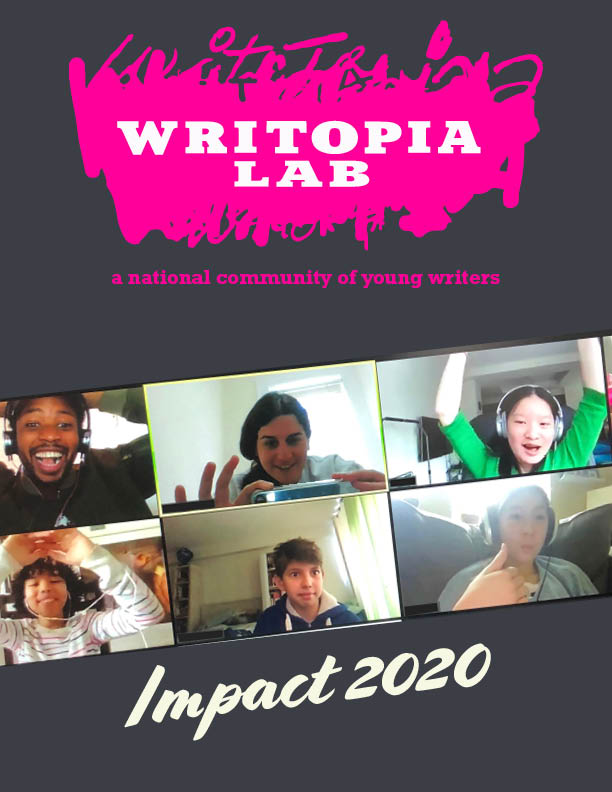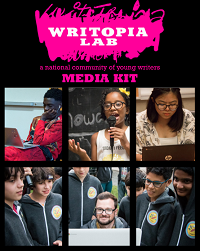July 9, 2019

Is teaching writing as important as teaching reading?
When we think of literacy, we tend to think of reading. Schools, literary nonprofits and philanthropists often focus on encouraging students to be strong readers with solid comprehension skills.
While those skills are crucial, many experts say critical and creative writing skills are equally important, and are too often overlooked.
Compared to reading, writing is more active, encouraging students to be independent thinkers, take ownership over their own stories and ideas, and communicate them clearly to others, says Elyse Eidman-Aadahl, executive director of the National Writing Project, which offers resources for teachers who want to encourage students to write.
"Unless we want an education system just focused on making people consumers and not focused on helping them be producers, this emphasis on reading only, which does happen in so many places, is very short-sighted," she says.
Even when students are given writing assignments, she explains, the work tends to focus on assessing a text, rather than on presenting a new idea. Writing, she says, should be "the central thing you're learning. Not writing on a test, not writing to demonstrate you're learning what someone has taught you, but also really writing as an author writes."
Reading, of course, contributes immensely to one's personal growth. But teaching it together with writing nurtures both, says Rebecca Wallace-Segall, executive director of a New York City writing center, Writopia Lab.
"Writing impacts your ability to read," she says. "Over 90% of our kids who come in as reluctant writers, parents have reported they become more engaged readers as they've fallen in love with the writing process."
From a practical standpoint, writing is more important than ever; we depend on it for personal and professional communication.
"We see this from employers all the time. They're looking for folks who can write," says Eidman-Aadahl. "Certainly with digital tools right now, think of what we're all doing all day. We're probably interacting with the internet through writing."
Kids are already writing all the time, in texts, emails and social media posts.
"Whether they're actually being provided with the opportunity to learn to write, whether schools are addressing it or not, they're already writing and publishing," Eidman-Aadahl says. "Every young person is an author today if he or she is connected to the Internet. So we have to help them do it in the best, most responsible, critical, prosocial way."
Advocates of teaching writing say it is empowering.
"When students own their voices and tell their stories, they become not only stronger and more confident writers, but also stronger and more confident individuals," says Ali Haider, executive director of the Austin, Texas-based creative writing center, the Austin Bat Cave.
Wallace-Segall says writing also helps students work through difficulties.
"Creative writing, it's a lifeline for us," she says. "We're watching kids work through their greatest challenges, subconsciously. They're not writing a story about a difficult father or directly about a bully in class, but they are creating a fictional scenario that might feel distant enough for them to go deep into it."
And teaching students to write can have an impact on the larger world, notes Dare Dukes, executive director of Deep Center, an organization in Savannah, Georgia, that works with young writers to share their stories with policy makers, judges, politicians, police officers and the like.
"So those adults can see that the stories they're telling themselves about those young people are often wrong and doing a lot of harm in the world," says Dukes.
Copyright 2019 Associated Press. All rights reserved. This material may not be published, broadcast, rewritten, or redistributed.
Writopia Lab in the News
- Celebrating a Decade of Partnership: HFH’s Tierra Gunther Honored at Writopia Lab’s 2025 Gala
- AWS in Kimball Union Magazine Fall-Winter 2025
- A Cry to The Education System: New York’s Reading Mandate Could Be the Hope for Literacy Proficiency & Individuality
- Why Writing is the Ultimate Leadership Skill with Rebecca Wallace-Segall
- Whose text is it: the student's or the artificial intelligence's?
- Writopia in The Forward
- CUNY Newsletter
- Mommy Poppins List 2023
- CUNY TV Spotlight
- Writopia Gets Kids to Tell Their Stories (Village Voice)
- Partnering for Literacy Impact: By Susan Matloff-Nieves & Rebecca Wallace-Segall
- Ridgefield Resident Sofia Schaffer is Writing a Name for Herself
- Inviting Joy into Classroom Writing Instruction: by Danielle Sheeler
- Columbia University News
- Education Week
- New York Times: Worldwide Plays 2019
- The Rockridge News: Local Creative Writing Workshops
- LA Times HS Insider: Writopia at 4th Annual YALLWEST
- Townvibe Bedford: Writopia's Léna Roy Speaks on "A Wrinkle in Time"
- Oakland Magazine: Coolest New Writing Lab for Kids
- The Washington Post: Writopia Lab for Introverted Children
- The Washington Informer: SEED Students Honored at Scholastic Writing Awards
- Broadway World: Writopia Lab's Worldwide Plays Festival
- New York Family: Alternative Summer Camps
- New York Times: Family Memoir Workshop
- Washington Post: 7 Ways to Get Kids Excited About Writing
- New Paltz Oracle: Writopia as a Creative Outlet for Kids
- Forward: Rebecca Wallace-Segall, founder of Writopia Lab
- Washington Independent Review of Books: Writopia Open House, June 12th, 2016
- ICPH Uncensored: Writopia Lab's Worldwide Plays Festival
- The BACC Rag: Annelie Hyatt Performs at the Nuyorican
- CBS LA: Summer Activities For Kids In Los Angeles
- DC Public Library: Creative Writing Workshop Series
- Arizona Daily Star: St. Gregory Seniors Win National Play Contest
- Book Culture: Writopia Lab Reading
- Take Part: A Case for More Creative Writing
- in Reads: The Founding of Writopia
- New York Nonprofit Press: Writing Your Way to Success
- Johns Hopkins: Writopia's Younger Students Create at JHUMCC
- Georgetown Patch: DC Students' Plays Produced Off-Broadway
- NPR: 2013 Scholastic Art & Writing Awards
- Jersey City Independent: JC 11-Year-Old’s Play ‘9/11’ Showcased in New York Festival
- New York Times: 13-Year-Old Writopia Playwright
- Bronx Neighbors: 12-Year-Old Writopia Playwright
- Voice of America: Program Nurtures Young Writers
- Washington Post: Inside a Writopia D.C. Workshop
- Time Out Kids: Writopia Summer Camps
- The Atlantic: A Plea for Creative Writing in Schools
- NY1: Young Playwrights Get Works Performed At Festival
- Mommy Poppins: Best New NYC Summer Day Camps for Kids
- The Epoch Times: Interview with Rebecca Wallace-Segall, founder of Writopia
- Shelf Awareness: Writopia's Lena Roy Featured at Voracious Reader
- New York Times - Arts Beat: Interview with Writopia Playwright
- Park Slope Patch: Park Slope Teen Grier Montgomery's Play Selected for Writopia's 2011 Worldwide Plays Festival
- New York Times - City Room: Interview With Dan Kitrosser, Artistic Director of Writopia's 2011 Worldwide Plays Festival
- The Arlington Connection: Writopia Lab Brings the Scholastic Arts & Writing Awards to D.C.
- Alexandria News: DC Scholastic
- Huffington Post: 2011 Plays and Workshops
- Time Out New York: 2011 Plays Contest
- Time Out New York Best of 2010: Camps
- New York Mag: Bryant Park Listing
- New York Times: Bestival
- Cornwall-on-Hudson News: Lena Beckenstein
- Time Out Kids: Radiant Windows
- Northwest Passages: DC Teen Contest
- The Wall Street Journal: In Praise of 'Thought Competition'
- The Jewish Week
Our Mission
Writopia Lab fosters joy, literacy, and critical thinking in children and teens from all backgrounds through creative writing.
We have never turned away a student whose family was unable to pay for workshops. Fifty percent of our students attend on either partial or full scholarships.
Just For Fun
Have a birthday? Party with us! Have your very own Writopia Lab Birthday Party.
Check out our online store and take a piece of Writopia Lab home with you!
Enroll Now!
Weekly Trimester-Long Workshops
Check out the Weekly Trimester-Long Schedule.
Holiday & School Break Workshops
Check out the Half-Day and Full-Day schedules.
Join the Team!
If you love writing and want to share that love with young writers, apply today to join Writopia Lab! Click here to learn more!
Summer Camp!

